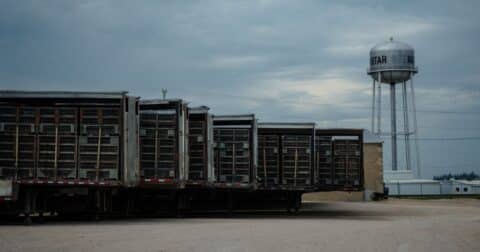Fact Check
Fact-Checking Claims Made About Oklahoma’s Lawsuit Against Tyson Foods
Food•5 min read
Reported
‘250,000 gallons of untreated beef processing waste’ flowed into the local water supply, the notice states.


Words by Nina B. Elkadi
In Postville, Iowa, a town with a population of 2,503, the slaughterhouse Agri Star Meat and Poultry LLC is the largest employer. Although there is no publicly available data on how many animals are slaughtered at Agri Star every day, in 2010, CEO Hershey Friedman hoped the plant could “process 1,000 head of cattle per day within a couple of years.” In December 2024, three non-profit organizations filed an intent to sue Agri Star for illegally discharging animal waste products into public waterways. The slaughterhouse has until February 21, 2025, to respond and answer how they will comply with the Clean Water Act — or the suit will be filed.
Attorneys working on the current case claim that Agri Star has been violating its National Pollution Discharge Permit — a Clean Water Act rule aimed at limiting excessive pollution from point sources — by illegally discharging large quantities of animal processing waste. Last year, “250,000 gallons of untreated beef processing waste,” flowed into the Postville water supply, the notice states.
Agri Star, formerly known as Agriproccessors, is no stranger to controversy (under different ownership, in 2008 it was the site of one of the largest immigration raids in U.S. history, which also found child labor violations).
“The City of Postville stated that while Agri Star worked to fix the blocked sewer line, Agri Star did not appear to limit or cease production — processing waste continued to flow to the City’s treatment system at a rate of 148 to 164 gallons per minute,” the attorneys wrote. This resulted in “an interference with the City of Postville’s normal wastewater treatment process,” which is a violation of their permit. As a result, the Postville water treatment facility was shuttered for two days.
The intent to sue notice was co-authored by Driftless Water Defenders, a non-profit Iowa-based group working to protect Iowa waterways from agricultural polluters, as well as Public Justice and FarmSTAND, both non-profit legal advocacy groups.
“We’ve got a very powerful structure of industrial agriculture that has found a way to feel immune to the pressures of individual citizens to rebuff them, particularly on political fronts,” counsel for the Driftless Water Defenders board of directors James Larew tells Sentient. “They’re so strong and that litigation is a critical ingredient that we need, because the laws like this one are on the books. They need to be enforced. And so we state that we’re there to litigate.”
Iowa is at the forefront of what some experts are calling a water quality crisis. As the state with the most animals being raised in confinement, animal waste, which is often illegally discharged, has become a central component of Iowa life.
Chris Jones, a water quality expert and president of Driftless Water Defenders, explains that prior to the passage of the Clean Water Act, Iowa’s waterways were completely “dead” due to slaughterhouse discharges. The Clean Water Act changed things — but without enforcement, the law obviously becomes less efficacious.
“Our [Department of Natural Resources] is not exactly zealous about enforcing rules and doing things that are going to improve the quality of our water,” Jones tells Sentient. “Anybody with eyes and ears in their head can see and hear that. I think they’re reluctant to do things that might appear to be unfriendly to industry or to agriculture, and as such, they sort of abdicated their role as a deterrent for these sorts of things.”
The overwhelming majority — 99 percent — of farmed animals in the U.S. are raised in factory farms. In Iowa, there are over almost 124 million farmed animals; around 55 million chickens, 53.4 million hogs, 11.5 million turkeys, and 3.7 million cattle and cows. With a new federal administration, Jones predicts that the livestock industry has the potential to expand even further, and regulations could diminish.
To demonstrate the extent of this issue, Jones poses a hypothetical scenario: What if the Des Moines wastewater treatment plant did not follow their pollution discharge permit requirements and decided to dump unlimited quantities of human waste into the Des Moines river, poisoning the water supply of a community 75 miles downstream?
“That’s essentially what [the Department of Natural Resources] is doing,” he says. “They’re just saying, okay, Agri Star, go ahead, dump whatever you want into the stream.”
The Iowa Department of Natural Resources and the Environmental Protection Agency have recently come under scrutiny for not enforcing these discharge permits strongly enough. Several groups sued the EPA for their lack of enforcement under the Clean Water Act, and in October 2024 the court struck them down.
Holding polluters accountable through targeted lawsuits, Larew tells Sentient, is one potential path forward.
The Iowa Department of Natural Resources declined to comment due to pending litigation.
In lieu of strong federal or statewide enforcement, these legal groups see themselves as “private attorneys general,” Public Justice attorney Daniel C. Snyder says. To remedy the harm caused by these discharges, the groups are calling for civil penalties against Agri Star.
“Those civil penalties are meant to deter these exact types of violations. You have a penalty that is high enough so that everyone goes, ‘Wow. We should take notice of that. We should make sure we’re complying with our permits so that Driftless Water Defenders or other groups don’t come around and say, hey you you are also in violation of the act,’” Snyder tells Sentient.
For these advocacy groups, the goal is not to put these operations out of business. Larew emphasizes that they are simply using public information and public laws to hold polluters accountable.
“I think there’s a public realization these last couple years in particular, that something’s really out of whack, that we feel threatened with the quality of our water,” Larew says. “[We have an] imbalance right now with the new industrial agricultural model, the concentration of livestock into particular areas, with waste so concentrated that it can’t be adequately used and it ends up being in our water.”
Agri Star did not respond to multiple requests for comment.